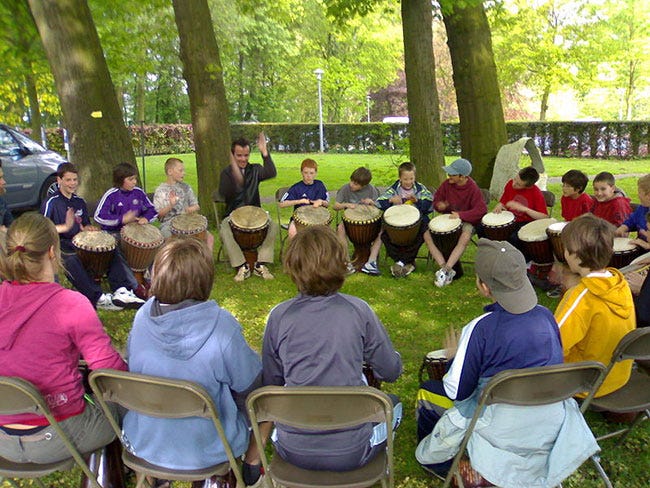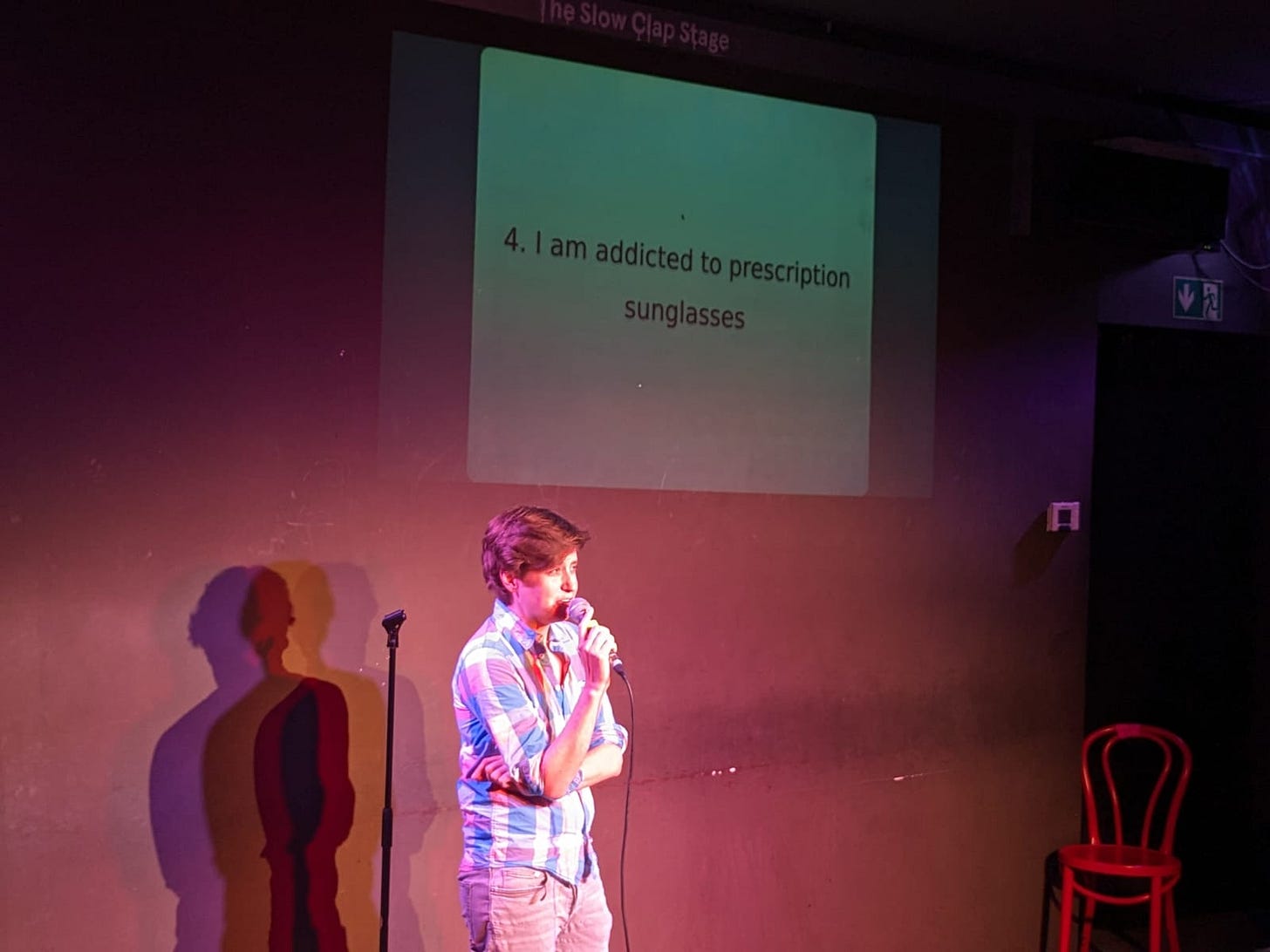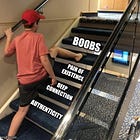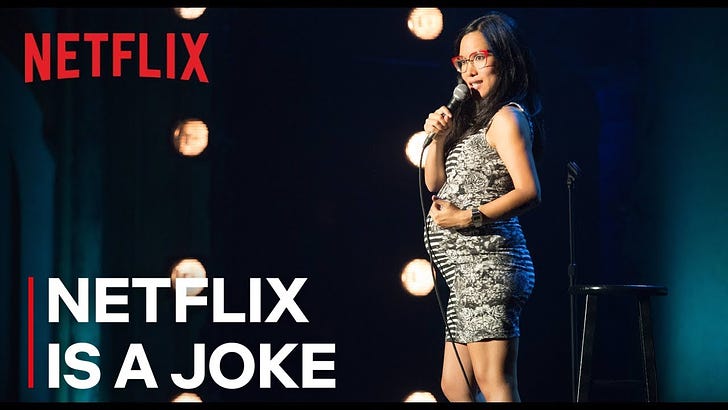Will an improv class make you a better stand-up?
Eventually, perhaps
I read a great article by improv legend
about the differences between stand-up and improv. And it gave me the idea for this article.He makes some really good points about how stand-up and improv are more different than you think.
Stand-up is like “Here’s what I’d like to talk about” and improv is “here’s my reaction to what’s happening to me.” - Will Hines
As someone who teaches both, I find that lots of stand-ups go to improv classes thinking it’ll make them better at crowdwork, looser on stage, and be able to write in the moment. I’m not saying it won’t help you with these things, but improv is this whole other skill that you need to dedicate yourself to - it’s not a performance enhancing drug.
Focus!!
If you are taking an improv class purely to help you be a better stand-up, I wouldn’t bother. You’ll be learning far more that won’t help you than will, and you’d be better off dedicating that time to stand-up. You certainly won’t get anything from an improv class if you’re half-assing it. If you’re studying improv it’s extremely beneficial to go to jams, and form a practice group. Can you handle it?
Generally doing a thing is the only way to make you better at that thing. You could probably use re-framing what you think of as progress and not comparing yourself to other people. Of course all of that is impossible, so just keep going!
Take an improv class if you want to learn improv
You should take an improv class if you’re really interested in learning how to improvise. Most of the funniest shows I have seen in my life that have stuck with me forever have been improv shows. But learn it because you love it, like any art-form it takes dedication, time and focus.
Stand-up comes from writing. Improv comes from acting. Stand-up is done in clubs, with bars and dinner guests. Improv comes from theaters, where there are plays and velvet seats. Stand-ups were the kids in the back of the class making comments under their breath. Improvisers were the theater nerds in the drama club. - Will Hines
Most artists have anxiety that they’re not getting good quickly enough, and doing an improv/clown/acting/hot yoga class might be some magic pill that will elevate you above the rest in record time. Just like how Sacha Baron Cohen and Eric Andre etc. made clowning popular because people thought that’s how you become as funny as them. I’ve done a couple of clowning classes and they were a fucking nightmare. If I wanted to get verbally abused by a man with a drum, I’d heckle a drum circle.
I was in a band in the early 00s called Deletia and we found out The Strokes recorded an EP in a studio in London. So of course I sent them a demo of my shitty band and asked them if we could record there, because I thought it would make us just like The Strokes. A few days later I got a weary reply of “You know this won’t make you as good as The Strokes”. Needless to say we didn’t record there, I don’t need those kind of hard truths in my life.
Here’s a great
article listing some principals of clowning.I occasionally run a show called Standup Vs. Improv at Comedy Cafe Berlin. It’s based on the show Setlist. The difference with my show is that we Book an equal amount of stand-ups and improvisers and pretend its a competition (it isn’t). The performers get 5 random topics and have to improvise stand-up from them. In general, improvisers fare better than the stand-ups because they know to riff from a place of emotional truth, and they’re not bothered with the outcome. The stand-ups get bogged down structuring jokes and trying to be clever. When the crowd aren’t responding well they’ll usually melt down and start doing awkward crowd-work or forbidden pre-written jokes. Improvised stand-up isn’t a real thing that exists outside of these gimmicky shows, but there’s always things to be learnt.
Here are some things an improv class might make you better at, or you might learn just as much from my articles 😇
Failing funny. Failing can be excellent if you embrace it, it could be the start of something much better than your joke.
Using real emotions. Truthful emotions always work better in improv, and that’s also true in stand-up but lots of noobs don’t realise this. An improv class can really drive this home where the only thing you have to steer your scenes is laughter.
Focus on one funny thing at a time aka Game. In improv we teach people to focus, explore the idea fully until it can’t be heightened any more, and then move on to the next thing. And then later maybe bring the other funny thing back - sound familiar?
Edgy humour is a crap shoot. In an improv setting edgy humour almost never lands because of the collaboration aspect. You’re potentially stepping over peoples boundaries when you don’t know them. This is true for stand up audiences. I’m not saying don’t cross the line, but be aware of the line and talk about the line. Don’t just schlep people over it and then berate them for having feelings.
If this is true, what else is true? Because improvisers have to work very quickly in the moment, they have to use creative visualisation and real emotions in order to heighten or tag a funny idea. They’re great at finding the balance between absurd and grounded and this is a great skill for a stand-up.
related:
Are you a stand-up that’s tried improv or vice-versa I’d love to hear your comments on if you think these forms compliment each other.














Oh no, I've signed up to a clown workshop and now I'm scared
dear caroline,
thanks for writing this thoughtful piece!
i'm a standup comic and i have some experience doing improv in college, taking improv classes and workshops, and doing improvised standup shows (like "setlist") pretty frequently, as well as doing a lot of riffing and improvising on stage to create standup material.
i agree with you that spending more time working on standup will probably make you better at standup than taking an improv class, and i also think that ANYTHING we do as humans in life can make us better at standup. taking an improv class, going to a museum, listening to music, engaging in conversation with a stranger on a train. pretty much everything we do can fuel the standup engine, i feel, whether it offers new joke ingredients or a new paradigm that can shift our artistic perspective. just knowing or learning that things outside of our previous experience exist can plant seeds that help lead to growth in our standup, or our lives in general, which can be good for our standup also.
maybe watching great improvisors or other artists can have the same effect, but i feel like learning new skills and practicing different art forms can expand the brain and offer more possibility for creation in the future, so as long as we're making choices and doing things intentionally, i guess learning improv or doing something else can be equally helpful.
and if anyone wants to take my improv commenty course where i teach you to leave improvised comments on the internet, i cannot guarantee it will help your standup.
sincerely thanks for sharing your thoughts! love your writing,
myq